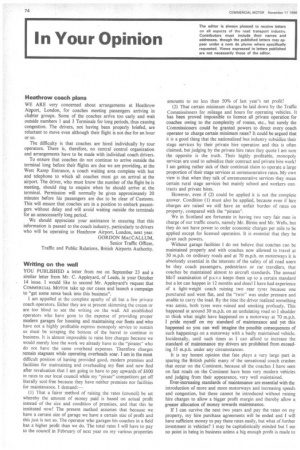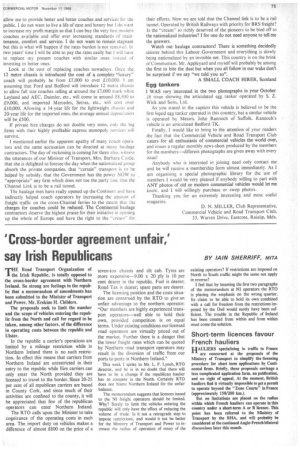Heathrow coach plans
Page 76

Page 77

If you've noticed an error in this article please click here to report it so we can fix it.
WE ARE very concerned about arrangements at Heathrow Airport, London, for coaches meeting passengers arriving in ch er groups. Some of the coaches arrive too early and wait outside numbers I and 3 Terminals for long periods, thus causing congestion. The drivers, not having been properly briefed, are reluctant to move even although their flight is not due for an hour or so.
The difficulty is that coaches are hired individually by tour operators. There is, therefore, no central control organization and arrangements have to be made with individual coach drivers.
To ensure that coaches do not continue to arrive outside the terminal long before their flights are due we are providing, at the West Ramp Entrance, a coach waiting area complete with hut and telephone to which all coaches must go on arrival at the airport. The driver, who must know the number of the flight he is meeting, should ring to enquire when he should arrive at the terminal. Permission will normally be given approximately 20 minutes before his passengers are due to be clear of Customs. This will ensure that coaches are in a position to embark passengers without delay and will avoid waiting outside the terminals for an unnecessarily long period.
We should appreciate your assistance in ensuring that this information is passed to the coach industry, particularly to drivers who will be operating to Heathrow Airport, London, next year. GORDON MAcCALLUM, Senior Traffic Officer, Traffic and Public Relations, British Airports Authority.
Writing on the wall
YOU PUBLISHED a letter from me on September 23 and a similar letter from Mr. C. Appleyard, of Leeds, in your October 14 issue. I would like to second Mr. Appleyard's request that COMMERCIAL MOTOR take up our cases and launch a campaign to "get some sense back into this business".
I am appalled at the complete apathy of all but a few private coach operators. Either they are at present skimming the cream or are too blind to see the writing on the wall. All established operators who have gone to the expense of providing proper modern garages for housing and maintaining our fleets and who have not a highly profitable express monopoly service to sustain us must be scraping the bottom of the barrel to continue in business. It is almost impossible to raise hire charges because we would merely lose the work we already have to the "pirates" who do not have the same overhead expenses. Therefore charges remain stagnant while operating overheads soar. I am in the most difficult position of having provided good, modern premises and facilities for maintaining and overhauling my fleet and now find after revaluation that I am going to have to pay upwards of £600 in rates to our local council while my "pirate" competitors get off literally scot-free because they have neither premises nor facilities for maintenance. I demand:—
(1) That a fairer method of raising the rates (council) be set whereby the amount of money paid is based on actual profit instead of the size and condition of premises, and that this be instituted now! The present method assumes that because we have a certain size of garage we have a certain size of profit and this just is not so. The operator who garages his coaches in a field has a higher profit than we do. The total rates I will have to pay to the council in February of next year on my various properties amounts to no less than 50% of last year's net profit!
(2) That certain minimum charges be laid down by the Traffic Commissioners for mileage and hours for operating vehicles. It has been proved impossible to licence all private operation for coaches owing to the complexity of routes, etc., but surely the Commissioners could be granted powers to direct every coach operator to charge certain minimum rates? It could be argued that it is a good thing that the nationalized bus industry subsidize their stage services by their private hire operation and this is often claimed, but judging by the private hire rates they quote I am sure the opposite is the truth. Their highly profitable, monopoly services are used to subsidize their contract and private hire work! I am getting rather sick of their continual claim to operate a large proportion of their stage services at unremunerative rates. My own view is that when they talk of unremunerative services they mean certain rural stage services but mainly school and workers contracts and private hires.
However, even if (2) could be applied it is not the complete answer. Condition (1) must also be applied, because even if hire charges are raised we still have an unfair burden of rates on property, compared with the "pirates".
We in Scotland are fortunate in having two very fair men in charge of our traffic courts, namely Mr. Birnie and Mr. Wells, but they do not have power to order economic charges per mile to be applied except for licensed operation. It is essential that they be given such powers.
Without garage facilities I do not believe that coaches can be maintained properly and with coaches now allowed to travel at 50 m.p.h. on ordinary roads and at 70 m.p.h. on motorways it is absolutely essential in the interests of the safety of all road users be they coach passengers, pedestrians or car travellers, that coaches be maintained almost to aircraft standards. The annual MoT examination of p.s.v.s keeps them up to a certain standard but a lot can happen in 12 months and does! I have had experience of a light-weight coach ruining two rear tyres because one punctured and went flat, and the "twin" was under pressure and unable to carry the load. By the time the driver realized something was amiss, both tyres were ruined and smoking profusely. This happened at around 30 m.p.h. on an undulating road so I shudder to think what might have happened on a motorway at 70 m.p.h. I pride myself on my standard of maintenance and yet this happened so you can well imagine the possible consequences of such happenings on a motorway with a badly maintained vehicle. Incidentally, until such times as I can afford to increase the standard of maintenance my drivers are prohibited from exceeding 55 m.p.h. under any circumstances.
It is my honest opinion that fate plays a very large part in sparing the British public many of the sensational coach crashes that occur on the Continent, because all the coaches I have seen on fast roads on the Continent have been very modern vehicles and judging from their appearance, very well maintained.
Ever-increasing standards of maintenance are essential with the introduction of more and more motorways and increasing speeds and congestion, but these cannot be introduced without raising hire charges to allow a bigger profit margin and thereby allow a greater allocation of money towards maintenance.
If I can survive the next two years and pay the rates on my property, my hire purchase agreements will be ended and I will have sufficient money to pay these rates easily, but what of further investment in vehicles? I may be capitalistically minded but I see no point in being in business unless a big enough profit is made to
allow me to provide better and better coaches and services for the public. I do not want to live a life of ease and luxury but I do want to increase my profit margin so that I can buy the very best modern coaches available and offer ever increasing standards of maintenance, comfort and service. I do not want to remain stagnant but this is what will happen if the rates burden is not removed. In two years' time I will be able to pay the rates easily but I will have to replace my present coaches with similar ones instead of investing in better ones.
Look at the cost of replacing coaches nowadays. Once the 12 metre chassis is introduced the cost of a. complete "luxury" coach will probably be from £7,000 to over £10,000. I am assuming that Ford and Bedford will introduce 12 metre chassis to allow full size coaches selling at around the £7,000 mark while Leyland and AEC, Daimler, etc., will come in around £8,500 to £9,000, and imported Mercedes, Setras, etc., will cost over £10,000. Allowing a 14-year life for the lightweight chassis and 20-year life for the imported ones, the average annual depreciation will be,£500.
If private hire charges do not double very soon, only the big firms with their highly profitable express monopoly services will survive.
I mentioned earlier the apparent apathy of many coach operators and the same accusation can be directed at many haulage contractors. The day of reckoning is coming for them also, witness the utterances of our Minister of Transport, Mrs. Barbara Castle, that she is delighted to foresee the day when the nationalized group absorb the private companies, that "certain" transport is to be helped by subsidy, that the Government has the power NOW to "appropriate" any firm which does not toe the party line, that the Channel Link is to be a rail tunnel.
ThE haulage men have really opened up the Continent and have indirectly helped coach operators by increasing the amount of freight traffic on the cross-Channel ferries to the extent that the charges for coaches could be reduced. The Continental haulage contractors deserve the highest praise for their initiative in opening up the whole of Europe and have the right to the -cream['or their efforts. Now we are told that the Channel link is to be a rail tunnel. Operated by British Railways with priority for BRS freight? Is the "cream" so richly deserved of the pioneers to be bled off to the nationalized industries? I for one do not need anyone to tell me the answers.
Watch out haulage contractors! There is something decidedly sinister behind this Labour Government and everything is slowly being nationalized by an invisible net. This country is on the brink of Communism. Mr. Appleyard and myself will probably be among the first to bite the dust but when you all follow in our wake don't be surprised if we say "we told you so".
A SMALL COACH HIRER, Scotland
Egg tankers
I WAS very interested in the two photographs in your October 28 issue showing the articulated egg tanker operated by S. Z. Wick and Sons, Ltd.
As you stated in the caption this vehicle is believed to be the first liquid egg tanker operated in this country, but a similar vehicle is operated by Messrs. John Rannoch of Suffolk. Rannoch's vehicle is an articulated Bedford TK.
Finally, I would like to bring to the attention of your readers the fact that the Commercial Vehicle and Road Transport Club caters for all enthusiasts of commercial vehicles the world over, and issues a regular monthly news-sheet produced by the members for the members—different photographs are given away with every issue!
Anybody who is interested in joining need only contact me and he will receive a membership form almost immediately. As I am organising a special photographic library for the use of members I would be very pleased if anybody willing to part with ANY photos of old or modern commercial vehicles would let me know, and I will willingly purchase or swop photos.
Thanking you for an extremely interesting and most useful magazine, D. N. MILLER, Club Representative, Commercial Vehicle and Road Transport Club, 33, Warren Drive, Eastcote, Ruislip, Mdx.
































































































































